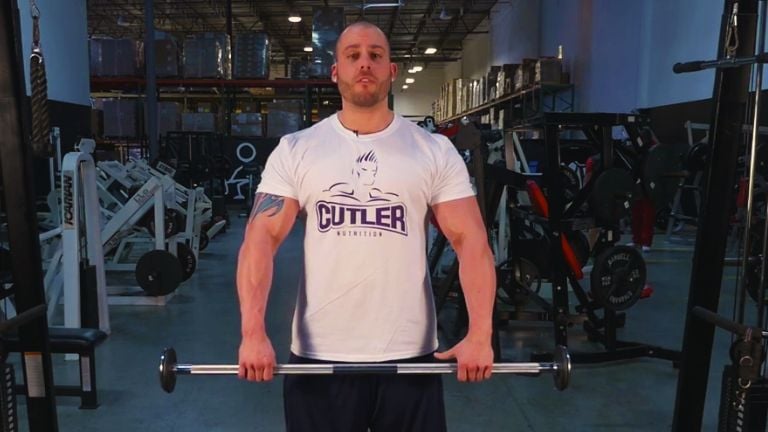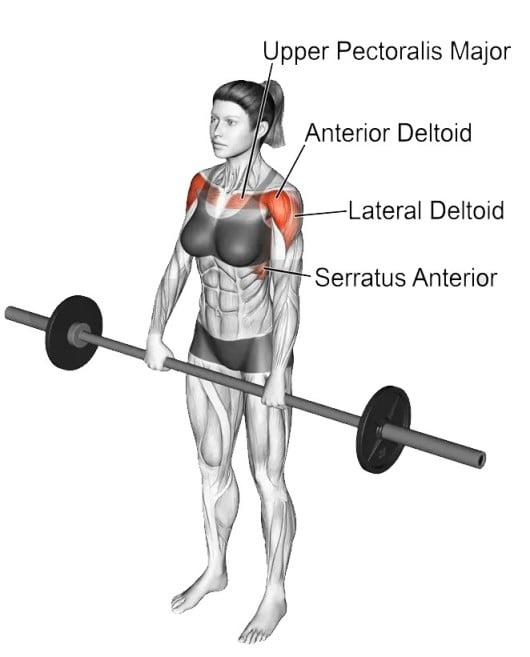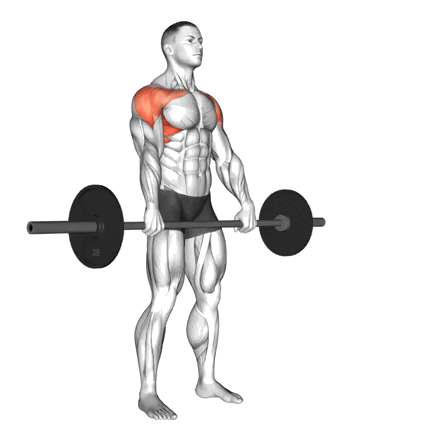The Barbell front raise is an isolation exercise that primarily targets the anterior deltoids (front muscles of the shoulders). This exercise also engages the lateral deltoids, upper chest, and trapezius muscles to a lesser extent.
This is a so-called isolation exercise, because it involves only one joint to perform the movement, unlike compound exercises, which use several joints, such as the Arnold press or military press for the shoulders.
Coming back to barbell front raises, this is a very good exercise for beginners that will allow you to have good sensations, even with light loads. For experienced practitioners, this exercise can be used at the end of shoulder training to get maximum muscle stimulation.
Unlike dumbbell front raise, the barbell forces both arms to work together and allows you to lift a bit heavy and progressively overload the muscles.
Want to take your gains to the next level? Discover your daily calorie needs with our free TDEE calculator

Barbell Front Raise Muscles Worked
The deltoid muscle of the shoulder consists of three separate sections or heads. The anterior deltoid (In front), Lateral deltoid (at the side) and Posterior deltoid (behind)
- The Primary Muscle Worked during Front barbell Raise is: Anterior deltoid
- Secondary Muscle Worked: Upper pectoralis, Trapezius, Serratus Anterior, Lateral Deltoid.

How To Do Barbell Front Raise
- Stand with your feet shoulder-width apart. Keep your back straight and your feet flat on the floor.
- Grip a barbell with an overhand grip, hands shoulder distance apart. Your arms holding the barbell should hang down.
- Keep the abdominal muscles tense.
- Inhale and lift the dumbbells straight up, with your arms straight in front of you and your palms facing the floor.
- Keep your elbows slightly bent to reduce stress on your elbow joints.
- Pause when your arms are roughly horizontal to the floor and use this time to contract your shoulder muscles strongly.
- Return the barbell to the starting position at thigh level with a slow, controlled movement while exhaling.
- Repeat this movement until you have reached the desired number of repetitions and sets.
To Stay Motivated: 150+ Gym Workout Motivational Quotes To Stay Fit
Form And Tips
- This is an isolation exercise, so the focus should be on form and muscle contraction, not weight.
- Keep your back straight and your head up. Keep your body still. Only your arm should move.
- Avoid shrugging your shoulders; keep them retracted and down.
- Keep your wrists straight and in line with your forearms.
- Use a full range of motion to maximize muscle engagement.
- Keep a controlled motion and avoid jerky movements.
- Breathe out as you lift the barbell and breathe in as you lower it.
- Start with a lighter weight and gradually increase as you become more comfortable with the exercise.
- Don’t let the barbell rest against your thighs at the bottom of the movement. Instead, stop just before it touches your legs.
- The front raise is an excellent exercise to superset with a shoulder pressing exercise.
- The number of reps you should perform depends on your goals, such as building muscle mass and endurance.
| Level | Sets | Reps | Frequency |
|---|---|---|---|
| Beginner | 2-3 | 8-12 | 1-2 times per week |
| Intermediate | 3-4 | 8-12 | 2-3 times per week |
| Advanced | 4-5 | 8-15 | 2-3 times per week |


Manish is a NASM-certified fitness and nutrition coach with over 10 years of experience in weight lifting and fat loss fitness coaching. He specializes in gym-based training and has a lot of knowledge about exercise, lifting technique, biomechanics, and more.
Through “Fit Life Regime,” he generously shares the insights he’s gained over a decade in the field. His goal is to equip others with the knowledge to start their own fitness journey.
